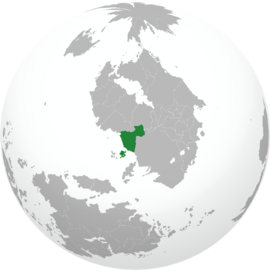Carna
Union of Carnish Councils | |
|---|---|
Motto: "Wirkers o the wirld, unite!" (Carnish) "Luchd-obrach an t-saoghail, aonachadh!" (Carnish Gaelic) | |
 Location of Carna (dark green) | |
| Capital and largest city | Dunaird |
| Official languages Recognised minority languages | Carnish Carnish Gaelic Ænglish |
| Ethnic groups |
|
| Religion |
|
| Demonym(s) | Carnish |
| Government | Federal semi-direct democracy under a non-partisan Bairdist republic |
| Robert Meighan | |
| Sarah Wylie | |
| Legislature | Forgaitherin |
| Formation | |
| 995 | |
| 26 June 1948 | |
| 3 February 1949 | |
| Area | |
• Total | 1,009,396 km2 (389,730 sq mi) |
| Population | |
• 2020 estimate | 98,863,541 |
• Density | 97.9/km2 (253.6/sq mi) |
| GDP (nominal) | estimate |
• Total | $4.647 trillion |
• Per capita | $47,006 |
| Gini | 21.2 low |
| HDI | very high |
| Currency | Carnish Siller (CSR) |
| Time zone | UTC-1 |
| Driving side | right |
| Internet TLD | .ca |
Carna, officially the Union of Carnish Councils, is a country in southern Levantia. It shares land borders with Wealdland to the west, Yonderre to the north, Urcea to the east, and Anglei to the northeast. It covers an area of 1,009,396 km2 (389,730 sq mi) which includes the island of Ardran as well as several smaller islands. The country has a population of almost 99 million, the vast majority of which is situated within the country's coastal regions and central belt. It is a highly decentralised federation comprising 77 peoples' councils. The national capital is Dunaird, the country's largest city and main cultural and economic centre. Other major cities include Malkirk, Inverleith, Dalfearn, Kinlaig, Craigshiel, Largmore, and Colgar.
By 300 CE, the Germanic Ænglish people had migrated into the central areas of modern Carna, establishing permanent settlements in the region. The south and southwestern coastal areas and the mountainous northern areas of Carna remained under the rule of the native Gaelic people up until the collapse of Great Levantia in 500 CE. This saw the Ængles conquer much of Carna, developing a distinct Ænglo-Gaelic culture that laid the foundation of the Carnish language. Following the dissolution of the Western Kingdom of the Levantines in 978, the Kingdom of Carna was founded in 995, beginning more than a millennia of independent Carnish rule. Calls for reform in the late 18th century would see the Carnish monarchy relinquish significant power to an elected parliament. Carna would enter the Great War in 1939, fighting alongside their former rival of Urcea. The country would exit the war in 1948 following the Carnish Revolution which saw the Carnish monarchy deposed and the subsequent establishment of the Union of Carnish Councils, the world's first and only Bairdist nation.
Since the Carnish Revolution of 1948, Carna has been governed as a non-partisan semi-direct democracy, with political parties being outlawed by its constitution. It is the world's only democracy that does not employ a multi-party or one-party system. Despite this, almost all representatives elected to its national legislature, the Forgaitherin, are followers of the communist ideology of Bairdism. This ideology sees the country organised as a highly decentralised union of workers', soldiers' and peoples' councils. The peoples' councils serve as the country's federal entities and are highly autonomous, wielding significant local power.
Carna is one of the three founding countries of the Treaty of International Assistance and Development (TRIAD) and it's capital, Dunaird, hosts the organisation's headquarters. The country is a highly developed nation, with an advanced high-income economy. It has very high standards of living, quality of life, education, health care, and is categorised as "very high" in the Human Development Index, with it offering expansive social security, a universal healthcare system free at the point of use, strong environmental protections, a tution-free education at all levels, and more. Due to its directly-democratic tendencies, strong powers of the electorate over elected officials, and high levels of electoral transparency, the country also ranks in first place in the Democracy Index.
Known for its long and rich cultural history, Carna has many World Heritage Sites and is among the top tourism destinations in Levantia. The country's national anthem, "Auld Lang Syne", has become an internationally recognised anthem which is sung around the world on New Year's Eve to mark the beginning of a new year.
Etymology
The name Carna comes from Carni, the Latin name for the Celtic peoples that inhabited the westernmost regions of Great Levantia. The name of the Carni is derived from the Carnish Gaelic word càrn, which is the root of the Carnish and Ænglish word "cairn". It is widely believed that the Latin name Carni was given to the westernmost Celts of Great Levantia due to the region's high density of cairns, with more ancient cairns being found in Carna than anywhere else in the world. This is further supported by the Carnish Gaelic name for the region, Càrna, literally meaning "Cairn land" or "Land of cairns".
